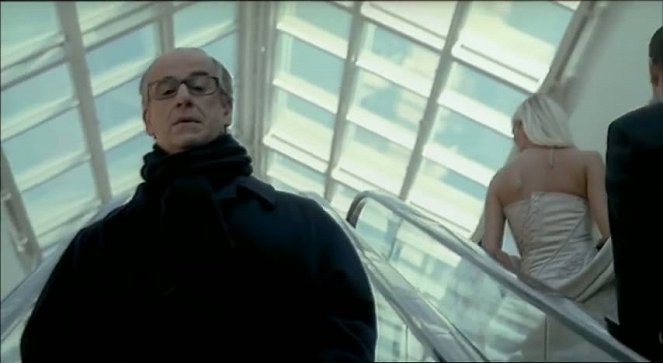Réalisation:
Paolo SorrentinoScénario:
Paolo SorrentinoPhotographie:
Luca BigazziMusique:
Pasquale CatalanoActeurs·trices:
Toni Servillo, Olivia Magnani, Adriano Giannini, Antonio Ballerio, Rolando Ravello, Angela Goodwin, Gilberto Idonea, Gaetano Bruno (plus)Résumés(1)
Mais quels sont les secrets de Titta di Girolama ? Cet homme de cinquante ans vit depuis huit ans dans une anonyme chambre d'hôtel d'un petit village suisse tout aussi anonyme. Huit ans sans parler à qui que ce soit. Huit ans à passer du hall au bar de l'hôtel, seulement entouré de cigarettes et de silence. Titta di Girolama semble être perdu dans la contemplation de quelque chose de caché. Chaque homme a un secret. Celui-ci en a plus d'un. (texte officiel du distributeur)
(plus)Critiques (5)
Formellement captivant et constamment surprenant sur le plan narratif. Toni Servillo est éblouissant. Cependant, à la fin, il n'y a aucune catharsis, juste le vide. Sur le plan thématique, L'Américain de Corbijn n'est pas moins artistique et il est plus significatif, harmonieux et satisfaisant aussi bien sur le plan émotionnel que intellectuel.
()
A man without imagination, wakefulness without dreaming, a face without expression. The world outside of the hotel room no longer exists for him. Life and death, comedy and tragedy are playing out in that world. The sudden change of style during the money transfer is just one of the director’s ironic jokes. This enlivening subsequently turns out to be a routine, another of the regularities that Titta di Girolamo lives by, which together with the repetitive camera movements give his life a precise rhythm. For Titta, stepping outside of his habitual way of doing things means risking everything. Viewers satiated with the classic style are constantly kept in a lively state by the smooth transitions between shots, well-choreographed dances along the horizontal and vertical axes, objective shots passed off as subjective and the building of false suspense. The richness of the form ingeniously contrasts with the “boring” content of the protagonist’s life. The deliberate incongruity between the long unchanging “about what” and the variable “how” enables Sorrentino to throw off the shackles of all narrative conventions and to speak through images and movement, to find the poetic in the profane. A minor change in Servillo’s poker-faced expression, a barely perceptible lifting of the corners of his mouth, not only indicates a major advance in the character’s development, but is also a conspiratorial wink from a filmmaker who is able to amuse himself without ever ceasing to entertain others. Basically like Tarantino, but a little more grown up. 85%
()
Is this a case that an intellectual and sophisticated aesthete like Paolo Sorrentino made a common genre film? Nope. He cleverly and with subtle sarcasm pulls the viewer's strings. It somewhat reminded me of the Coen brothers and their film No Country for Old Men, in terms of how it deals with audience expectations. However, Sorrentino's approach is more intimate, and slower, and his film has a distinctly Arthouse nature. No, The Consequences of Love is not primarily about crime, but rather about the feeling of the worst possible defeat in life, and above all, it is a film about revenge. Revenge beyond the grave, where the key to understanding the whole film lies in the opening scene, where the anti-hero looks out the window and watches a funeral procession. When you realize that you died ten years ago, you don't have to worry about the consequences anymore. Toni Servillo delivers a focused performance and proves that he belongs to the elite of the current Italian acting scene. Overall, this drama seemed to me the second most likable film by Sorrentino, although it certainly isn't for everyone. Overall impression: 80%.
()
Alors, je viens de voir pour la première fois un film du cinéaste italien primé et respecté Paolo Sorrentino. Je ne vais pas m’empresser de dire qu’il est aussi largement surestimé, parce que pour ça, il me faudrait voir La Grande Bellezza et faire la comparaison avec La Chasse. Dans ce cas-ci, on a droit à un film pour cinéphiles avertis avec son tempo lent, une ambiance relativement correcte et je dois dire que je m’impatientais de savoir quel autre secret le personnage principal allait nous révéler. Toni Servillo se contente d’arborer un « visage de pierre » pendant tout le métrage et je me demandais s’il allait au moins sourire un peu, ce qu’il a finalement fait une fois sur la fin. Un truc intéressant, c’est ces intermèdes « d’action » dans lesquels on nous diffuse une musique efficace. C’est comme si Sorrentino savait que le spectateur était en train de s’assoupir ou bien qu’il était perdu dans ses pensées à l’image de Titto, et qu’il voulait intentionnellement l’extirper de cet état dans le but de le ramener à son film. J’ai hésité entre trois et quatre étoiles, mais aujourd’hui, je ne me sens pas d’humeur généreuse.
()
Paolo Sorrentino demonstrates his ability to direct a film that will make you think, even just about why a particular shot is so long, yet you'll still be mesmerized by what's happening. It's a crime movie. At a slow pace and with emphasis on the performances, but still with a story that definitely doesn't bore and manages to captivate on multiple levels.
()

